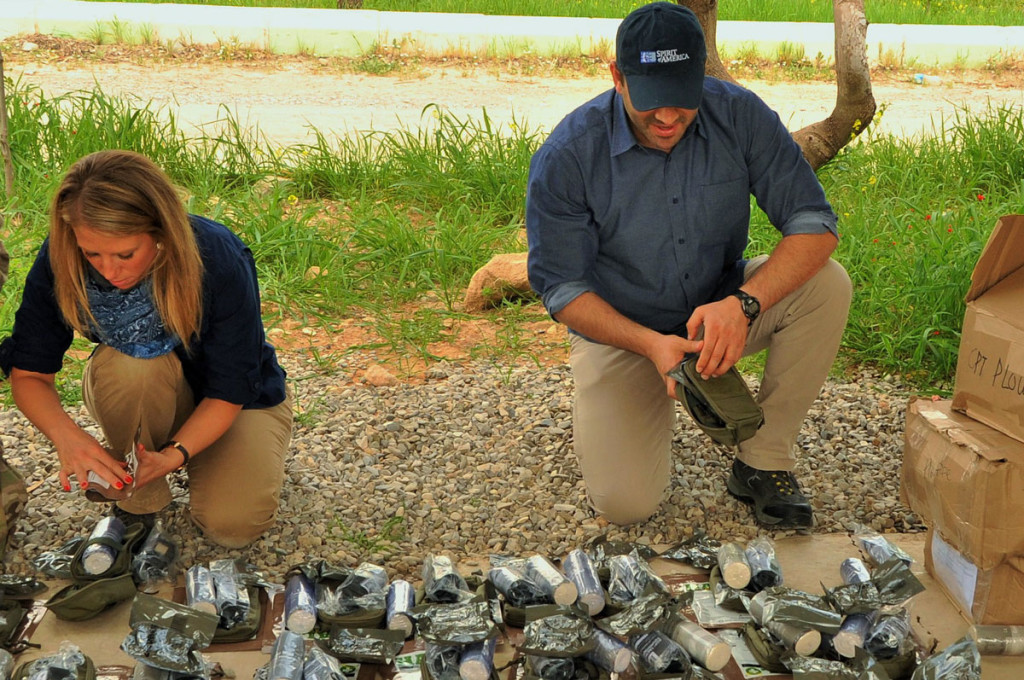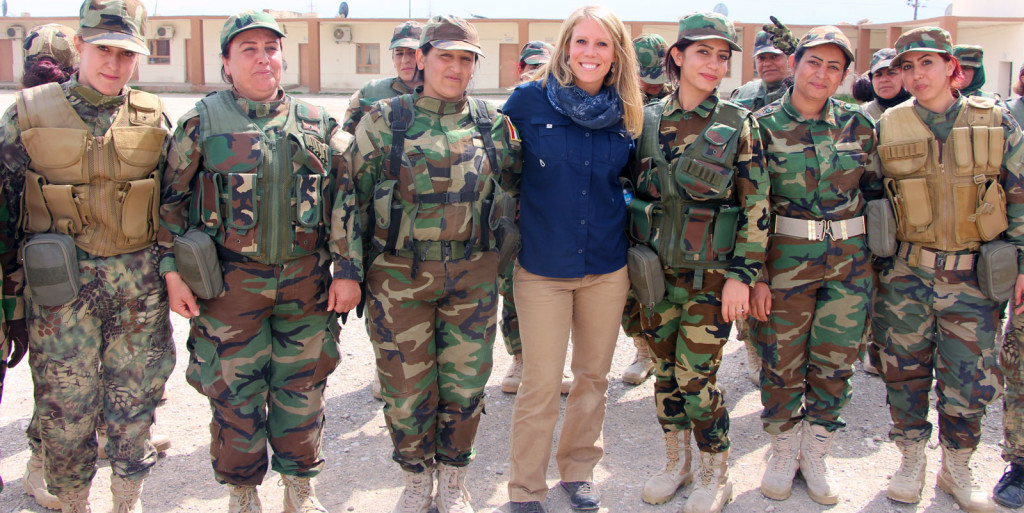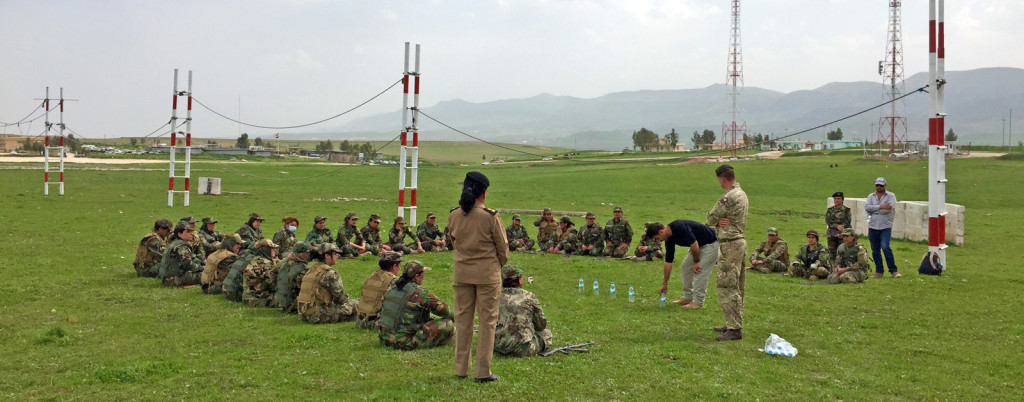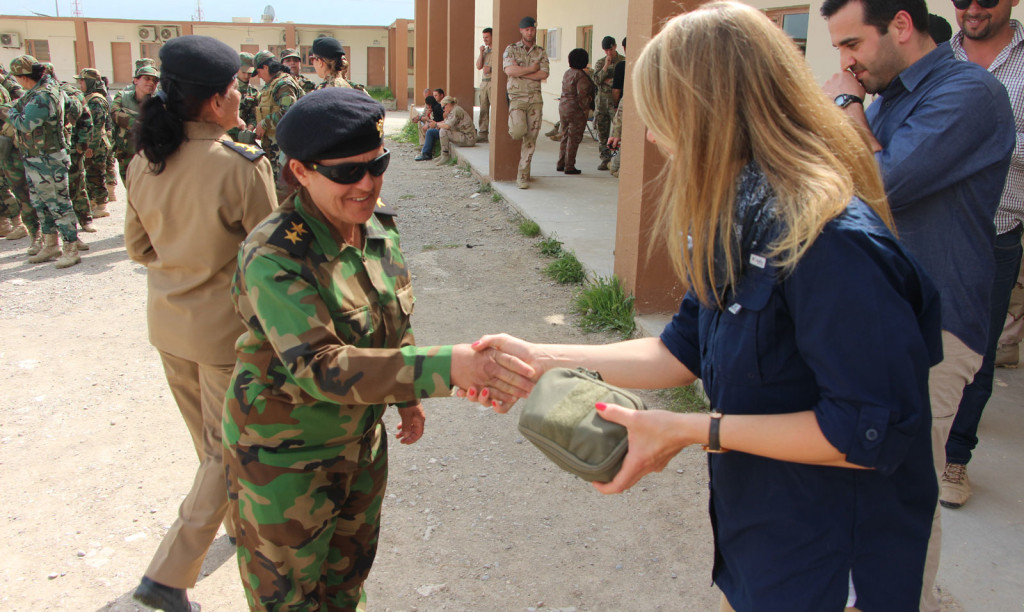SoA Equips All-female Peshmerga Unit Taking the Fight to ISIS

The soldiers are set to play a crucial role in the effort to defeat the Islamic State (locally referred to as Daesh) in Iraq, a fact that is particularly relevant to these women. Many of them have lost husbands and family members to the terrorist organization. They are serving to defend their homeland, and to seek justice.
The unit is commanded by Colonel Nahida Ahmad Rashid, an indomitable woman who has been a soldier since she was a teenager. Colonel Nahida embodies what military practitioners refer to as command presence, exuding the toughness of a seasoned military officer and the determination of someone with a mission in life. In a recent interview, she recounted instructions she once issued to her soldiers: “I have told all my frontline soldiers to keep one bullet in their pocket in case they are captured.” When meeting with her, it’s clear to see that the Spartan order was not rhetorical.
When the women of the unit first volunteered to serve, both the Kurdistan Regional Government (KRG) and the American command quickly saw an extraordinary opportunity: not only could these soldiers take the fight to the enemy at a time when every warfighter is indispensable, but, more crucially, these daring women could fulfill roles that their male counterparts cannot. Female soldiers can screen and process displaced girls and women flooding out of combat zones, ensuring that the victims are treated safely and with dignity.

SoA field managers, Nicholette Doliva and Zack Bazzi, along with members of the Army civil affairs team, preparing individual first aid kits for distribution
So American and British trainers got to work organizing, equipping, and training the battalion. With every passing week of training, the women gained the skills necessary to fight and thrive on the battlefield. They were transitioning from a group of individuals to frontline teams that can shoot, move, and communicate.
A crucial part of every soldier’s gear is the Individual First Aid Kit (IFAK). Soldiers trained on and equipped with IFAKs have a better chance of surviving the savagery of the battlefield. They also fight with greater conviction, knowing that if they are wounded in the fight, their teammates to their left and right have the tools and the know-how to take care of them. At the time, the resources were not available to procure the IFAKs. The civil affairs team identified them as a critical need to SoA. Working closely with our military partners, we rapidly developed a project to fund the provision of IFAKs that was specifically tailored to the contingencies the fighters are likely to face in combat. Every IFAK contained a trauma shear, a chest seal, gauze dressing, shrink-wrap, and a tactical field pouch to secure the kit on each soldiers webbing. Together with the training provided by American and British trainers, these IFAKs will help keep soldiers alive and in the fight.
When I asked Private Banaz, crisply dressed in green fatigues and flashing a gregarious smile, about the importance of the IFAK, she announced: “I’m very happy. This is the first time I see this. It will be very useful for us. When I have this on me, I’m not worried if I can save my friends.”
Banaz has been with the Peshmerga for four years now.
“Why do you serve?” I asked.
Without hesitation, she shot back: “ Because I’m a woman. I should know how to protect myself.” Eager to get her point across, she continued, “ Because the Peshmerga is a very beautiful name: those who face death.”
Listening to Banaz speak with such vigor and conviction, I could not help but swell with pride and nostalgia. I felt proud because my job allowed me to directly support a soldier in the fight against the Islamic State. I sensed nostalgia because Banaz reminded me of fellow soldiers I served with during my tenure in the Army.
SoA provided IFAKs for every soldier in the battalion, 255 in total. Not only did this improve the capacity of the all-female unit, it reaffirmed their role as defenders of their homeland and as an essential component of their military. Just as importantly, the decisive support that we provided was pivotal to the U.S. military’s effort to stand up units that can take the fight to ISIS, a fact that has not gone unnoticed. “These medical kits are more than just an additional piece of equipment to add to their gear,” said Major Allen Hill, the Army public affairs officer based at the forward Coalition headquarters in Erbil. He continued, “It is a symbol of their commitment to each other, their country and the fight against a global threat that they will ultimately help defeat.”

SoA Field Manager Nicholette Doliva, a veteran of the war in Afghanistan, bonding with fellow veterans
Not surprisingly, it was Colonel Nahida that succinctly summed it all up: “Thank you for the American people.” She paused before continuing, “This is not the first time the American people help us. We never forget the Americans who have died for our liberty. We now have freedom. We are grateful for the American people for helping us.”



